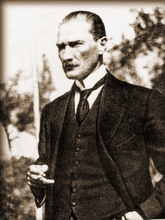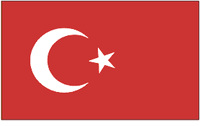This site was brought to my attention in a comment on my December 4 entry. Thank you, whoever you are!
I like what I see so far: good information and enthusiasm. That bought it a spot on my "My Links" list.
It's a good day when resources are brought to me as opposed to me having to go out a look for them. Nice! Hoş!
Saturday, January 12, 2008
Wednesday, January 9, 2008
Mutlu Yıllar!
Yes, friends, with the new year, I want to try different things. As of today, I'm trying out this particular template because it's light, spread out nicely across the entire page (as opposed to being bunched up in the center), and things like my pic of Atatürk have been moved over to the left.
Hoşçakal.
Hoşçakal.
Tuesday, January 8, 2008
Saat iki
Rosetta Stone continues to drill me on time. As a part of reinforcing that, I decided to see how many hits I'd get by punching "saat iki" (2 o'clock) into a Google search. Among the 1.2 million hits (!!), I found this—http://www.hikayeler.net/yazilar/saat-iki/.
Among other things, this site includes a poem called, yep, Saat İki. Seeing it gave me the thought of trying to parse through it as opposed to parsing through a Turkish news article. Would it be easier or harder? I don't know. I do know, however, that it's less important what I try to parse than the parsing effort itself, within reason.
The poem's a bit long so I don't know if I can parse it all in one sitting (i.e., post). But here goes.
"Takvimlere yine yenik düştü günler"
Takvim means calendar. -lere? I don't recognize the suffix. The closest thing to it I recall is -leri and -ları, which means their. "Their calendar" then? Maybe. Maybe not. Moving on for now. Let's see if the context answers the question.
Yine means "1. again, once again, once more. 2. still, nevertheless, even so".
Yenik means partially eaten, eroded, defeated. Hm, doesn't look like this will be a perky poem.
Düştü has me stumped. It's not listed in the online dictionary. Düş means dream but that doesn't seem to fit here. As I browsed the dictionary, I noticed that words starting with düş seem related to falling (düşmek).
Günler means days. No mystery there!
So, that first line seems to say something like "It's that time of year again, eroding, fallen days..." Autumn?
We'll see. I've got to sign off for now.
Among other things, this site includes a poem called, yep, Saat İki. Seeing it gave me the thought of trying to parse through it as opposed to parsing through a Turkish news article. Would it be easier or harder? I don't know. I do know, however, that it's less important what I try to parse than the parsing effort itself, within reason.
The poem's a bit long so I don't know if I can parse it all in one sitting (i.e., post). But here goes.
"Takvimlere yine yenik düştü günler"
Takvim means calendar. -lere? I don't recognize the suffix. The closest thing to it I recall is -leri and -ları, which means their. "Their calendar" then? Maybe. Maybe not. Moving on for now. Let's see if the context answers the question.
Yine means "1. again, once again, once more. 2. still, nevertheless, even so".
Yenik means partially eaten, eroded, defeated. Hm, doesn't look like this will be a perky poem.
Düştü has me stumped. It's not listed in the online dictionary. Düş means dream but that doesn't seem to fit here. As I browsed the dictionary, I noticed that words starting with düş seem related to falling (düşmek).
Günler means days. No mystery there!
So, that first line seems to say something like "It's that time of year again, eroding, fallen days..." Autumn?
We'll see. I've got to sign off for now.
Monday, January 7, 2008
iki adam ata biniyor

Man, I do admire Rosetta Stone (RS). However, I wish they had an answer key for some of these tougher phrases.
"Iki adam ata biniyor" is one of them. RS just shows me a picture of two men atop horses, riding them slowly across a field (nice idyllic image, though the image presented here is from a great John Ford movie named The Searchers). Parsing this was a little confusing:
- iki means 2, of course
- adam means man/men
- ata, on the other hand, can mean father or ancestor or be short for Atatürk. After a while, it dawned on me that perhaps this is one of those cases where a vowel was tacked onto at (horse). Doh! Lo and behold that's the case here. If this is an instance of the vowel harmony rule, its application escapes me in this case. What does the -a mean here?
- biniyor's root apparently is binmek: to know how to mount a horse or to know how to ride one.
Hold up—I just found "ata binmek" at my favorite web-based Turkish dictionary declaring the definition of "ride a horse" as "ata binmek". Oddly enough, if I look up "ata binmek" there, it says it means only "ride".
In any event, close enough for me! So, the -a tagged onto "at" is, apparently, not a vowel harmony application but just some kind of exception. Noted. :^)
Wednesday, December 5, 2007
Translation exercise 1
Bob's site references some links to Turkish sites. That gave me the idea of trying to read Turkish news and see how much I can recognize. To the extent that I'm clueless, to that extent my motivation increases to work harder to learn more.
In this case, I chose this headline: Benzinde 4 yeni kuruş indirim. My translation is this: 4 new reductions of gasoline prices.
Since I had to struggle to get that much, that's my clue to work harder. My goal is to be able to finish reading a Turkish news article with a minimum of trips to my Turkish/English dictionary.
In this case, I chose this headline: Benzinde 4 yeni kuruş indirim. My translation is this: 4 new reductions of gasoline prices.
Since I had to struggle to get that much, that's my clue to work harder. My goal is to be able to finish reading a Turkish news article with a minimum of trips to my Turkish/English dictionary.
Note to "whining politically correct nitwits"
Another reason for me to like Bob Cromwell, author of the site I raved about in my previous post, is this quote from his background page: "The third person singular pronoun o means "he", "she", and "it" equally. So, all whining politically correct nitwits should learn Turkish immediately and use it exclusively."
Tuesday, December 4, 2007
Turkish grammar on the web
Hey, look what I found—basics of Turkish grammar on the web. It's a freakin' gold mine of Turkish study material!
Google is the ever fertile search engine that led me to it. All I needed to do was decide to conduct a search on "Turkish grammar". This puppy was the first hit.
I decided to do the search because I was in the midst of practicing my Turkish via Rosetta Stone (RS). I found myself wanting to understand a point of grammar more clearly. RS is mainly a lot of pictures with Turkish words with the idea, apparently, being that you'll learn ostensively -- i.e., via showing you a thing or action and placing with it the appropriate word or words along with how they sound. Very helpful for this novice.
However, I also want to understand things. So, hearing and seeing "atın üstünde bir kız" (a girl atop a horse) along with practicing "oğlanın üstünde bir top" (a ball atop a boy), I wanted to break down the -ın ending of horse (at) and boy (oğlan). However, my usual Turkish grammar book is still in storage somewhere following my months long renovations project.
Hence my hope I could scare something up on the web. My expectations were low. What I found was gold.
I find it interesting this site was built by a man who's into a lot of heavy technical matters. I'm impressed, to put it gently.
Anyway, my thanks go to this fine fellow for producing another resource for me to sink my teeth into.
Maşallah!
Google is the ever fertile search engine that led me to it. All I needed to do was decide to conduct a search on "Turkish grammar". This puppy was the first hit.
I decided to do the search because I was in the midst of practicing my Turkish via Rosetta Stone (RS). I found myself wanting to understand a point of grammar more clearly. RS is mainly a lot of pictures with Turkish words with the idea, apparently, being that you'll learn ostensively -- i.e., via showing you a thing or action and placing with it the appropriate word or words along with how they sound. Very helpful for this novice.
However, I also want to understand things. So, hearing and seeing "atın üstünde bir kız" (a girl atop a horse) along with practicing "oğlanın üstünde bir top" (a ball atop a boy), I wanted to break down the -ın ending of horse (at) and boy (oğlan). However, my usual Turkish grammar book is still in storage somewhere following my months long renovations project.
Hence my hope I could scare something up on the web. My expectations were low. What I found was gold.
I find it interesting this site was built by a man who's into a lot of heavy technical matters. I'm impressed, to put it gently.
Anyway, my thanks go to this fine fellow for producing another resource for me to sink my teeth into.
Maşallah!
Subscribe to:
Posts (Atom)

